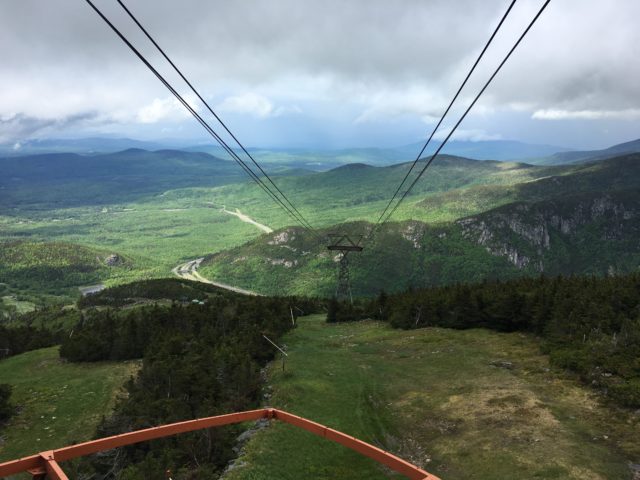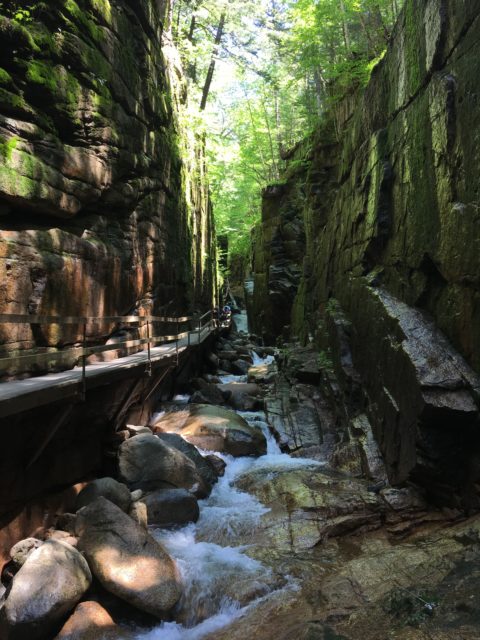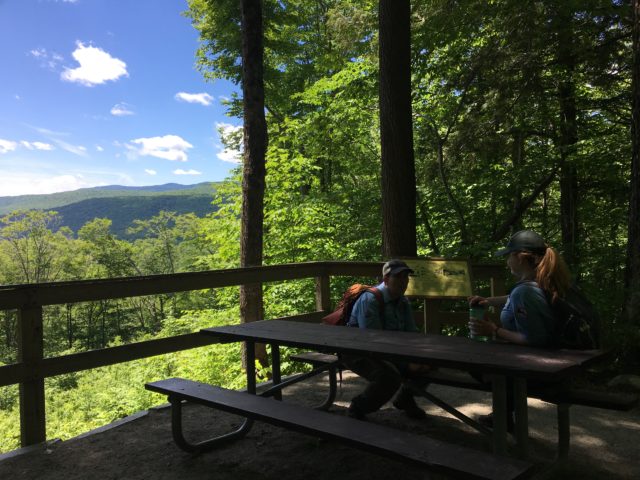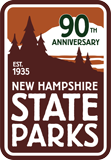By Sarah Sherwood, SCA Franconia Notch State Park Interpretive Ranger and NH Corps Member
June 12, 2019 was arguably the most exciting day of service for the Interpretive Rangers of the SCA New Hampshire Corps. On this sunny Wednesday we departed Bear Brook State Park, our home of five months, and went our separate ways to a dozen state parks across New Hampshire. I drove my small car, stuffed to the ceiling with personal and interpretive gear, about an hour and a half north of Bear Brook to my new home at Franconia Notch State Park. For the next week, my task was to become intimately familiar with the incredible park in order to provide informed programming to the hoards of hikers, outdoor-lovers, climbers, fishermen, boaters, and visitors who would descend on the infamous notch over the coming four months.

I am not a foreigner to Franconia Notch. I grew up on Cape Cod with nature-loving parents who often heard the call of the White Mountains. I first hiked to and stayed overnight at the Appalachian Mountain Club (AMC)’s Lonesome Lake Hut when I was in elementary school; my younger sister served on her first AMC Hut Croo at Greenleaf Hut on Mt. Lafayette last summer. Franconia Notch is one of the first places I fell in love with the mountains. I still have my original Junior Ranger badge, which now seems like a promising omen of my current position as one of Franconia’s Interpretive Rangers.

It shouldn’t come as a surprise that exploring a park as a carefree tourist is markedly different from seeing it through the eyes of a brand-new employee. As a Ranger, part of my job is to gain the ability to view the park through a wide variety of perspectives. I must be ready to listen to the needs of the user and respond with appropriate recommendations. On my most recent excursion to Lonesome Lake, I found myself considering how I would describe the trail to a family with young children versus an experienced mountaineer. Then I compared it with the two-mile loop around the Flume Gorge, the park’s most popular destination. The wider, flatter trails of the Flume loop appeal to young families whose kids might tire on the steeper sections of the Lonesome Lake trail. However, an experienced climber with a swift hiking pace might become frustrated with the narrow stairs in the Flume, which don’t afford many opportunities for passing slower walkers. The many trail options stemming from Lonesome Lake would probably hold more interest for this visitor. Questions and comparisons like this have been constantly in the back of mind during this exploration week of my park. I am no longer here to find personal joy in the park; I am here to provide it to others. Luckily for me, I have discovered through my position that creating a pleasant experience in the parks for others is exactly what constitutes a gratifying experience for me.

Visitors services like those described above make up about half of the job at Franconia. In the Hiker Cabin at Lafayette Campground, my colleague Eilís and I will answer questions ranging from trail recommendations to the location of the bathroom. The other half of the time, I will be presenting nature-based programming throughout the park. Topics will include geology, natural and cultural history, wildlife, local trees and plants, campfire stories, safe hiking practices, and more. During my exploration week I have had to split my time between preparing to answer visitor questions about the park and getting the kind of hands-on research unique to a park employee. Every outing to Echo Lake, the Cannon Aerial Tramway, or any of the other beautiful destinations at Franconia has included a close observation of the surrounding environment. At the top of Cannon Mountain, I took a close look at the alpine habitat and its unique plant life. At the Flume Gorge I dove into the geologic formations that created such a beautiful water feature. Every plant is an opportunity to identify something new and each unusual marking on a rock or tree becomes an exciting mystery to solve. Hiking with Interpretive Rangers is a prolonged process – we stop every couple of yards to check out some cool environmental feature. Although some of our research inevitably must come from written material, I have found in this past week that there is no substitute for outdoor exploration when it comes to getting excited and informed about environmental education. As a visitor to the park, these discoveries were intriguing but often overshadowed by the pursuit of the summit or the big view payoff. As a Ranger, every new piece of information is an inspiration for a potential program, a new motivation to continue sharing the park’s wonder with others. The forests and mountains that once appealed to me as a recreational wonderland have become something more: a treasure trove of fascinating natural processes.

I am adjusting to the transition from being a student to a teacher of the wonders of the outdoors. I am finding that there is no greater privilege as a Ranger than to be able to share my enthusiasm for Franconia with its patrons. Along with my fellow Interpreters, I am blossoming into the role of being both a caretaker and educator for the magnificent park that is Franconia Notch, and it feels fantastic.
